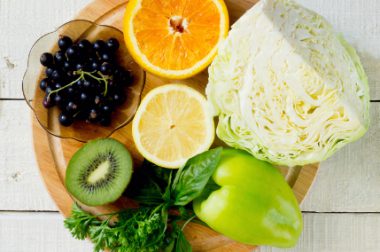- Vitamin C plays numerous essential roles in the body
- It facilitates the absorption of iron from food, especially plants
- Overall, vegetables have a higher vitamin C content than fruits
- It is sensitive to heat and light
- It must be consumed regularly
Why should we
eat some daily?
The body does not store vitamin C. This is why it needs some every day.
What is
its role?
Vitamin C has many roles in the body, as it is involved in numerous chemical reactions that are essential to its protection and proper functioning.
- It acts as a powerful antioxidant: vitamin C is involved in the neutralization of free radicals, which are harmful substances in the body resulting from damage by external factors (such as pollution, smoking, and the rays of the sun) and from cellular aging.
- It facilitates the assimilation of iron: vitamin C facilitates the intestinal absorption of iron (from the intestine into the bloodstream). Thanks to vitamin C, the body better assimilates iron from food, especially that of plants (vegetables, fruits, grains, pulses, etc.)
- It is also involved in defending the body against bacterial and viral infections, as it contributes to immune responses, especially during and after intensive physical exercises.
- It contributes to reducing tiredness, and to the proper functioning of the nervous system.
- It helps produce collagen, the substance that holds together our skin, bones, blood vessels, cartilage, gums, and teeth.
- It contributes to healing wounds.
- It helps to regenerate another vitamin: vitamin E.
How was
it discovered?
By sailors! In the 13th century, Gilbert de Aquila had already noticed that fruits and vegetables could prevent scurvy (the most serious form of vitamin C deficiency, causing a loosening of the teeth, purulent gums, hemorrhages, and eventually death), a disease sailors would suffer from during long trips out at sea.
It is only in the 18th century that a Scottish doctor, James Lind, confirmed that eating lemons, which are naturally rich in vitamin C, prevented scurvy in sailors. Vitamin C was officially discovered in 1928 by a Hungarian scientist named Albert Szent-Gyorgyi.
What is the
recommended intake?

Where is
it found?
It is found in vegetables, fruits, aromatic plants, and types of foods such as potatoes, which can provide a considerable amount of it depending on how often they are consumed.
The average content ranges from 10 mg to 30 mg/100 g of plants consumed, with high variations depending on the type of plant, the maturity level, and the time between harvest and consumption.
Remember: Vitamin C is concentrated in the parts of the plant exposed to the sun. Therefore, there is much more of it in the leaves than in the roots.
Vegetables and other foods
that are sources of vitamin C
| Foods with the highest vitamin C content | mg/100g |
| Fresh blackcurrant, fresh parsley | 200 |
| Canned guava | 180 |
| Raw red bell peppers | 165 |
| Raw green bell peppers | 127 |
| Raw broccoli | 110 |
| Raw black radishes | 100 |
| Kiwi | 80 |
| Cooked broccoli, cooked Brussels sprouts, chives, cress, strawberries, lychee | 60 |
| Fresh lemons, oranges | 52 |
| Raw cauliflower, fresh orange juice | 50 |
| Fresh mangoes, clementines, red currants | 42 |
| Raw spinach, cooked cauliflower, lamb’s lettuce, raw dandelions | 35-40 |
| Cooked sorrel, raspberries, melons, raw sweet potatoes, veal liver, raw radishes, raw purslane, cooked green cabbage | 20-26 |
| Cooked rutabagas, cooked Swiss chard, raw celeriac, raw tomatoes, pattypan squash, arugula, chicken liver, veal brains | 15-19 |
| Raw red kuri squash, cooked fava beans, cooked turnips, cooked asparagus, cooked spinach | 10-12 |
| Source: Ciqual |
Preconceived notions
about vitamin C
Oranges are not the richest source of vitamin C!
Contrary to popular belief, on average, vegetables have a higher vitamin C content than fruits. There is more vitamin C in raw bell peppers than in kiwis or oranges! In fact, eating more vegetables than fruits increases vitamin C intake. The frequency with which we eat vegetables also impacts vitamin C intake, even if the vegetables are not rich in vitamin C. For example, in France, people tend to eat large quantities of green beans and cabbages often (130 to 250 g/serving), which makes them highly significant sources of vitamin C for the average consumer.
Remember: Vegetables contribute to meeting our daily need for vitamin C at least as much as fruits.
Vitamin C is not an energizer and does not prevent you from sleeping.
Vitamin C has often been accused of causing insomnia and restlessness. The results of the studies on the subject are very contradictory. As of today, there is no proof that vitamin C has any impact on insomnia or restlessness when consumed in normal quantities as part of the diet or as a supplement (less than 1 gram/day).
What are
its particularities?

Vitamin C is the most fragile of vitamins. It is water-soluble, meaning it dissolves in water. It is also sensitive to heat, light, and oxygen, which participate actively in destroying it. This causes problems for its preservation while cooking or storing food.
Advice to preserve vitamin C:
- Store foods containing vitamin C in a cool place away from light and oxygen, ideally in the vegetable drawer in the fridge.
- Eat fruits and vegetables immediately after cutting them.
- Whenever possible, do not peel vegetables, especially if they are organic, in order to protect the flesh.
- Blanch fresh vegetables (especially green ones) in boiling water for 1 minute before cooking. Blanching vegetables allows you to eliminate oxidase enzymes and reduce oxygen, which limits the loss of vitamin C and better preserves the flavor and texture of the vegetables. Ideally, do this before freezing the vegetables.
- Choose gentle and quick cooking methods such as using the microwave or wok, steaming, and sous vide cooking.
- Cook vegetables until al dente at most.
What if I eat
too much or too little?
There is no risk of serious deficiency in developed countries
Serious deficiencies in vitamin C (which lead to scurvy, the main cause of mortality for ship crews on long distance sea travel from antiquity to the 18th century) still occur today in the developing world. In industrialized countries, there does not seem to be major vitamin C intake issues in children and teenagers, even if some people have a somewhat insufficient intake or higher needs.
Excess vitamin C is eliminated
There is no real risk of having excess vitamin C. It is impossible to reach a potentially toxic level of it with a regular diet. Above a certain threshold, the body eliminates excess vitamin C through urine and stools, as the intestines can no longer absorb it. This physiological reaction explains why certain people have diarrhea when they consume too much vitamin C. Watch your consumption!
Who needs vitamin C the most?
- Smokers A 20% vitamin C supplement is advisable for people who smoke more than 10 cigarettes per day in order to counteract tobacco-related oxidative stress.
- People with health problems (fracture, infections, cancer treatment). They also have a greater need for vitamin C.
- Athletes practicing intense physical activities.
- People who consume excessive amounts of alcohol.




